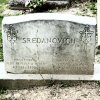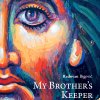The Odd Adventures of an Early Serbian Priest
Fr. Philip Sredanovich is one of the strangest parish priests I’ve ever run across in my research of Orthodoxy in America.
He was born in Montenegro in 1881. He seems to have been educated and married in Russia (the 1920 U.S. Census says that his wife was born in Russia). Fr. Philip came to America just after the turn of the 20th century. In 1908, he made headlines nationwide for his supposed invention of a device to travel around the earth without moving. From the Washington Post (12/11/1908):
The Rev. Philip Sredanovitch, pastor of the Greek Orthodox Church and editor of Justness, today announced a discovery, which, if it works out, will put Newton, Franklin, and Edison in the amateur class. The pastor-editor declares that he has invented a means by which the rotation of the earth on its axis may be taken advantage of in travel, and that by standing still one may go around the world in 24 hours.
He says he has found a way by which men may lift themselves above the earth to a point where they will stand still while the earth, rotating from west to east, will do their traveling for them. The secret is jealously guarded by the pastor and his wife, whom he credits with suggesting the idea. He asks $100,000 for the invention.
Sredanovich says: “We will hoist ourselves above the earth and await the coming of the desired place, then we will lower ourselves where we desire to be. In this way we may go from America to Europe in less than eighteen hours. My secret is how to stand above the earth and not be affected by the earth’s attraction.”
He says his invention makes it possible to get away from gravitation and still not be lose [sic] in space.
He does not say how one may get away from the swirling earth and take his stand in the ethereal world, but any one with $100,000 may find out. So far as is known, the pastor has invented no airships nor announced any scheme for climbing a sunbeam.
This has to be a joke, right? An educated clergyman couldn’t seriously think that you could circle the globe simply by “hoisting” yourself above the earth — could he?
This was when Fr. Philip was serving in Butler, Pa. He bounced around a lot. Here is an incomplete list of the places he served:
- Wilmerding, Pa.
- Butler, Pa.
- Kansas City
- South Bend, Ind.
- Gary, Ind.
- Kansas City (again)
- Butte, Mont.
- Milwaukee, Wis.
- Steelton, Pa.
- Johnstown, Pa.
- Butte (again)
In those days, it was common for priests to spend just a couple of years (or less) at one parish before moving on to the next. But Fr. Philip’s travels seem to have been caused as much by his own personality as by the era in which he lived.
In November 1920, his parish council in Kansas City “fired” him, and he responded with four successive lawsuits in the span of three months. (This was before the Serbs had a bishop in America, and parish councils hired and fired priests, pretty much at will.) In one lawsuit, Fr. Philip asked for $25,000, alleging that “church officials were instrumental in causing slanderous remarks to be printed against him” in a Serbian newspaper. A few days later, he filed another lawsuit, this time merely seeking $120 in back pay (around $1,400 in today’s money). I don’t know the outcomes of these cases; my only source is the Kansas City Times, 1/25/1921.
After leaving Kansas City, Fr. Philip went to Butte, Montana, where he took over Holy Trinity Serbian Church. One day, in November of 1922, he was walking down the street when a group of teenage boys started to bother him. One picked up a rock, at which point Fr. Philip took off for his house. He went inside, got his pistol, and returned to the street. The youths continued to taunt Fr. Philip, who responded by shooting one of the boys in the foot. The injured 18-year-old was taken to the hospital, and Fr. Philip was arrested and charged with second-degree assault. (This is from the Idaho Daily Statesman, 11/30/1922.)
Fr. Philip soon left Butte (no idea if this incident was the reason), but he returned to the parish in 1949, spending the last three years of his life there. He died in 1952 and is buried at St. Sava Serbian Orthodox Monastery in Libertyville, Illinois.
Matthew Namee
Source: Notes on Church History
(Matthew Namee is a founding director of the Society for Orthodox Christian History in the Americas (SOCHA). He also manages SOCHA’s website and blog, Orthodox History.)





